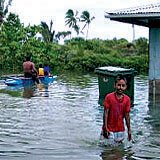UNESCO's Natural Sciences Program is very much involved in the development of understanding of the natural phenomena that underlie disasters. In some cases, that understanding may help societies avoid construction in dangerous areas. In others, it may help develop advanced warnings that may limit the impact of disasters.

Tsunami induced flooding.
Source: UNESCO
Read about UNESCO's global strategy for establishing tsunami early warning systems in
* the Caribbean,Read about the International Flood Initiative (PDF document).
* the Pacific and Indian oceans, and
* the Northeast Atlantic and Mediterranean.
Read about the global action plan launched on 20 January to reduce landslide losses.
Children are among the most vulnerable. The United Nations' International Strategy for Disaster Reduction's (UN/ISDR) global campaign on disaster risk education and school safety is titled Disaster risk reduction begins at school'. The two-year campaign was launched at UNESCO on 15 June. Its twin objectives are to make risk reduction part of the school curriculum and to improve school safety by encouraging the application of building norms to make sure schools can withstand any type of natural hazard.
No comments:
Post a Comment